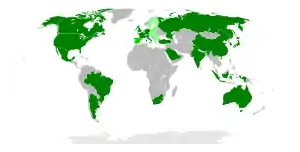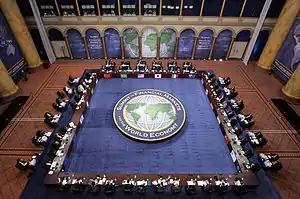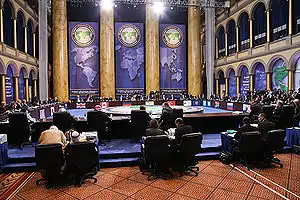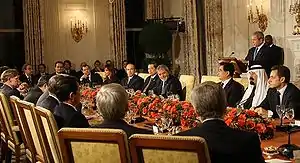2008 G20 Washington summit
The 2008 G20 Washington Summit on Financial Markets and the World Economy took place on November 14–15, 2008, in Washington, D.C., United States. It achieved general agreement amongst the G20 on how to cooperate in key areas so as to strengthen economic growth, deal with the 2008 financial crisis, and lay the foundation for reform to avoid similar crises in the future.[1][2] The Summit resulted from an initiative by the French and European Union President, Nicolas Sarkozy, Australian Prime Minister Kevin Rudd, and the British Prime Minister, Gordon Brown.[3][4] In connection with the G7 finance ministers on October 11, 2008, United States President George W. Bush stated that the next meeting of the G20 would be important in finding solutions to the economic crisis. Since many economists and politicians called for a new Bretton Woods system (a monetary management which was instituted after World War II) to overhaul the world's financial structure, the meeting has sometimes been described by the media as Bretton Woods II.[1]
| G20 Summit on Financial Markets and the World Economy | |
|---|---|
 The G20 in Washington, D.C. | |
| Date | November 14 and 15, 2008 |
| Venue(s) | National Building Museum Washington, D.C., United States |
| Participants | G20 |
| Precedes | 2009 G20 London summit |
| Key points | |
| |
Preliminary history
Approaches in the early 2000s
Bretton Woods II was an informal designation for the system of currency relations which developed during the '00s . As described by political economist Daniel Drezner, "Under this system, the U.S. is running massive current account deficits to be the source of export-led growth for other countries. To fund this deficit, central banks, particularly those on the Pacific Rim, are buying up dollars and dollar-denominated assets."[5]
The notion of a "revived Bretton Woods system" was introduced in a 2004 paper by Dooley, Folkerts-Landau, and Garber, in which it is described as arising after the end of the Cold War, out of the choice of countries, "mainly in Asia, [which] chose the same periphery strategy as immediate post-war Europe and Japan, undervaluing the exchange rate, managing sizable foreign exchange interventions, imposing controls, accumulating reserves, and encouraging export-led growth by sending goods to the competitive center countries.[6] In 2005, Roubini and Setser opined that: "If the US does not take policy steps to reduce its need for external financing before it exhausts the world's central banks willingness to keep adding to their dollar reserves – and if the rest of the world does not take steps to reduce its dependence on an unsustainable expansion in US domestic demand to support its own growth – the risk of a hard landing for the US and global economy will grow.... a sharp fall in the value of the US dollar, a rapid increase in US long-term interest rates and a sharp fall in the price of a range of risk assets including equities and housing. The asset price adjustment would lead to a severe slowdown in the US, and the fall in US imports associated with the US slowdown and the dollar's fall would lead to a global severe economic slowdown, if not an outright recession."[7]
Financial crisis of 2007–
On September 26, 2008, French President Nicolas Sarkozy, said, "We must rethink the financial system from scratch, as at Bretton Woods."[8]
On October 13, 2008, British Prime Minister Gordon Brown said world leaders must meet to agree to a new economic system. "We must have a new Bretton Woods, building a new international financial architecture for the years ahead."[9] However, Brown's approach was quite different than the original Bretton Woods system, emphasising the continuation of globalization and free trade as opposed to a return to fixed exchange rates.[10] There were tensions between Brown and Sarkozy, who argued that the "Anglo-Saxon" model of unrestrained markets has failed.[11]
Italian Economics Minister Giulio Tremonti said that Italy would use its 2009 chairmanship to push for a "New Bretton Woods." He was critical of the U.S.'s response to the global financial crisis of 2008, and suggested that the dollar may be superseded as the base currency of the Bretton Woods system.[12][13][14] On 20 October 2008, Tremonti told the Italian daily Corriere della Sera that proposals for a new Bretton Woods had been spread for many years by American political activist Lyndon LaRouche.[15]
The Summit


The formula is "G7 plus". In announcing the summit, US President George Bush said that the summit would bring together members of the G20. The G20 was set up to respond to the financial turmoil of 1997-99 through the development of policies that "promote international financial stability". The G20 comprises countries considered to be systemically important, but omits over 170 governments (192 governments are members of the United Nations).
The first meeting of the G20 leaders on financial markets and the world economy was held in Washington, D.C. on November 14–15, 2008, at the National Building Museum. The participants were: Argentina, Australia, Brazil, Canada, the People's Republic of China, France, Germany, India, Indonesia, Italy, Japan, Mexico, Republic of Korea, Russia, Saudi Arabia, South Africa, Turkey, the United Kingdom, the United States of America, the European Union (represented by France's President Nicolas Sarkozy as President of the European Council, as well as by José Manuel Barroso, president of the European Commission), the Netherlands (allowed extraordinary presence), Spain (allowed extraordinary presence), the World Bank, the International Monetary Fund and the Financial Stability Forum. Although Dutch Prime Minister Jan Peter Balkenende arrived at Andrews Air Force Base on the evening of November 14, he immediately returned to the Netherlands when notified of the death of his father; the Netherlands was instead represented by State Secretary Jan Kees de Jager.[16]
Spanish Prime Minister José Luis Rodríguez Zapatero was not initially invited, but was "so desperate to secure an invitation" to the summit, that he traveled "to Asia to seek the help of President Hu Jintao of China."[17] Zapatero eventually extracted an invitation through "intense lobbying" of French President Nicolas Sarkozy, who happened to hold two invitations (the second French invitation was due to the fact that France held the Presidency of the Council of the European Union during this period).[18]
Core participants
The following participants of the Washington summit include the core members of the G20, which comprises 19 countries and the European Union which is represented by its two governing bodies, the European Council and the European Commission,[19] as well as other nations and regional organizations invited to take part.


Suggestions
German Chancellor Angela Merkel and French President Nicolas Sarkozy said "Bretton Woods II" should bring about "genuine, all-encompassing reform of the international financial system".[21] The Council of the European Union sees the meeting as "tak[ing] early decisions on transparency, global standards of regulation, cross-border supervision and crisis management, to avoid conflicts of interest and to create an early warning system, so as to engender confidence among savers and investors in every country." In announcing the meeting, the spokesperson for US President George Bush said that "leaders will review progress being made to address the current financial crisis, advance a common understanding of its causes, and, in order to avoid a repetition, agree on a common set of principles for reform of the regulatory and institutional regimes for the world's financial sector". UK Prime Minister Gordon Brown, in a mid-October speech, set out several principles. These include transparency (internationally agreed accounting standards, credit insurance market standards), integrity (credit agencies, executive pay), responsibility (board member competency and expertise), sound banking practice (protecting against speculative bubbles). While addressing the G20 leaders, Chinese President Hu Jintao listed four priorities in reforming the international financial system: stepping up international cooperation in financial regulation; advancing reform of international financial institutions; encouraging regional financial cooperation; and improving the international currency system.[22] Foreign ministry spokesman Qin Gang said the agreement was "comprehensive, positive and balanced".[23] Prior to this summit, Japan's Prime Minister, Taro Aso, had contributed feasible action plan based on the analysis of the surplus of Japan's international balance of payments in spite of her prolonged economic slump to The Wall Street Journal,[24] and also provided his idea includes funding in the meeting. Eventually Japan provided the International Monetary Fund 100 billion U.S. dollar to bolster the fund during the global economic and financial crisis.[25]
Key achievements
The White House reported that the summit had reached what would be the Washington declaration. The five key objectives the leaders agreed upon were:
- reached a common understanding of the root causes of the global crisis;
- reviewed actions countries had taken and would take in the future to address the immediate crisis and strengthen growth;
- agreed on common principles for reforming their financial markets;
- launched an action plan to implement those principles and asked ministers to develop further specific recommendations that would be reviewed by leaders at a subsequent summit; and
- reaffirmed their commitment to free market principles.[26]
A summary of the meeting's other salient points is presented by the White House in the "Fact Sheet"[26] while the full conclusions are given in the Summit Declaration.[27]
Despite the optimism expressed by many of those present, doubts soon began to emerge about the success of the meeting and the chances of achieving all its objectives.[28]
The 2009 G20 management troika (U.K., Brazil, South Korea) is charged with coordinating the task of coming up with the content and method of implementing the 47 short and mid-term objectives by March 2009.[29]
Follow-up Summit meetings were held on April 2, 2009 in London,[30] and in September 2009 in Pittsburgh.
From participating delegations
 – Brazilian President Luiz Inácio Lula da Silva welcomed the summit's decision to give a role to the emerging economic powers like Brazil, Mexico, Russia, China and India in restructuring the global economy.[31]
– Brazilian President Luiz Inácio Lula da Silva welcomed the summit's decision to give a role to the emerging economic powers like Brazil, Mexico, Russia, China and India in restructuring the global economy.[31] – Chinese President Hu Jintao listed four priorities in reforming the international financial system: stepping up international cooperation in financial regulation; advancing reform of international financial institutions; encouraging regional financial cooperation; and improving the international currency system.[22] Foreign ministry spokesman Qin Gang said the agreement was "comprehensive, positive and balanced"[23]
– Chinese President Hu Jintao listed four priorities in reforming the international financial system: stepping up international cooperation in financial regulation; advancing reform of international financial institutions; encouraging regional financial cooperation; and improving the international currency system.[22] Foreign ministry spokesman Qin Gang said the agreement was "comprehensive, positive and balanced"[23] – After the meeting, French President Nicolas Sarkozy said: "For the first time, countries as different as those at this G20 in the United States have reached agreement on the principles, the procedures for action and on an ambitious action plan."[32]
– After the meeting, French President Nicolas Sarkozy said: "For the first time, countries as different as those at this G20 in the United States have reached agreement on the principles, the procedures for action and on an ambitious action plan."[32] – German Chancellor Angela Merkel said that the stalled Doha round of global trade talks should be pushed forward so that a basic agreement could be reached before President Bush leaves office in January.[33]
– German Chancellor Angela Merkel said that the stalled Doha round of global trade talks should be pushed forward so that a basic agreement could be reached before President Bush leaves office in January.[33] – Indian Prime Minister Dr. Manmohan Singh welcomed the summit "for the first time there was a genuine dialogue between many of the developed countries and the emerging economies"[34] He also added that the summit was "a clear indication that the balance of power is shifting in favour of emerging economies".[35]
– Indian Prime Minister Dr. Manmohan Singh welcomed the summit "for the first time there was a genuine dialogue between many of the developed countries and the emerging economies"[34] He also added that the summit was "a clear indication that the balance of power is shifting in favour of emerging economies".[35] – Japanese Prime Minister Taro Aso spoke about the impact on the poorer countries if nothing is done, how to avoid it, and how to help them. 12 out of 15 plans written by Aso(Based on so called Aso-plan, sent to New York Times) ended up on the final agreement. Including Japan funding IMF with 100 billion dollars. This had led other countries to put in larger sums of funds, thus stabilizing the safety net for the countries in need financially. This is believed to have stopped the total collapse of world economy from the Lehman Brothers financial crisis.[36]
– Japanese Prime Minister Taro Aso spoke about the impact on the poorer countries if nothing is done, how to avoid it, and how to help them. 12 out of 15 plans written by Aso(Based on so called Aso-plan, sent to New York Times) ended up on the final agreement. Including Japan funding IMF with 100 billion dollars. This had led other countries to put in larger sums of funds, thus stabilizing the safety net for the countries in need financially. This is believed to have stopped the total collapse of world economy from the Lehman Brothers financial crisis.[36].svg.png.webp) – President of South Korea Lee Myung-bak said "G20 nations must lead the way for the stalled WTO Doha Agreement to be concluded as soon as possible"[37] And He made keynote speech at G20 summit that G20 countries make a "Stand-Still" declaration on trade and investment restrictions.[38]
– President of South Korea Lee Myung-bak said "G20 nations must lead the way for the stalled WTO Doha Agreement to be concluded as soon as possible"[37] And He made keynote speech at G20 summit that G20 countries make a "Stand-Still" declaration on trade and investment restrictions.[38] – British Prime Minister Gordon Brown spoke at a press conference: "These are extraordinary times and they require extraordinary measures."[39] "If my sense of last night is right, at a next meeting, plans for the detailed reform of international institutions will be brought forward", he said after the meeting.[40]
– British Prime Minister Gordon Brown spoke at a press conference: "These are extraordinary times and they require extraordinary measures."[39] "If my sense of last night is right, at a next meeting, plans for the detailed reform of international institutions will be brought forward", he said after the meeting.[40] – President of the United States George W. Bush said: "We are adapting our financial systems to the realities of the 21st century".[33] VOA reported that after the summit Bush stated: "Our nations agreed that we must make the financial markets more transparent and accountable. Transparency is very important so that investors and regulators are able to know the truth."[41]
– President of the United States George W. Bush said: "We are adapting our financial systems to the realities of the 21st century".[33] VOA reported that after the summit Bush stated: "Our nations agreed that we must make the financial markets more transparent and accountable. Transparency is very important so that investors and regulators are able to know the truth."[41] – President of the European Commission José Manuel Barroso was pleased with the outcome of the summit: 'I can really say that this was a historic summit. I am very, very happy.' He added that no one had expected a miracle solution, emphasising that there was now a 'clear time schedule' for reforming the world financial system. 'This is the beginning of a process, not the end,' he explained.[42]
– President of the European Commission José Manuel Barroso was pleased with the outcome of the summit: 'I can really say that this was a historic summit. I am very, very happy.' He added that no one had expected a miracle solution, emphasising that there was now a 'clear time schedule' for reforming the world financial system. 'This is the beginning of a process, not the end,' he explained.[42]
From the press
The financial press generally welcomed the results of the summit but the Financial Times drew attention to the need for real global cooperation on the ambitious agenda[43] while The Wall Street Journal questioned whether the "regulatory crackdown on the kind of high-risk lending and investment that has led the world into a financial mess" might not backfire by causing an unwanted credit crunch.[44] Business Week listed a number of difficult fundamental questions finance ministers would now have to resolve by the end of March. These included trade tensions and protectionism, consumer spending, housing prices, a clampdown on lending practices and how to achieve global coordination.[45] The Hindu's Business Line opined that "it is all very well to speak blithely of new Bretton Woods institutions but, when there is no acceptance of a world mediated by Western ideas, the move is doomed ab initio."[46]
Similar efforts
The UN General Assembly set up an Interactive Panel on the Global Financial Crisis which held its first meeting in New York on 30 October 2008, led by Professor Joseph Stiglitz. It covered similar ground as the G20, but involving a broader range of countries, and lobbied for an agreement involving all members of the UN.[47] The panel's work was carried forward by a Commission of Experts on Reform of the International Financial System, also led by Stiglitz.
See also
References
- "European call for 'Bretton Woods II'". Eurodad. 2008-10-16. Archived from the original on 2008-10-19. Retrieved 2008-11-16.
- "Summit on Financial Markets and the World Economy". White House. 2008-11-11. Archived from the original on 2011-10-23. Retrieved 2008-11-16.
- Xu Yi-Chong (2011-08-03). "Australian Participation in the G20". Konrad Adenauer Stiftung. Retrieved 2019-06-29.
- Lex Rieffel (2008-10-27). "The G-20 Summit: What's It All About?". Brookings Institution. Archived from the original on 2010-06-03. Retrieved 2008-11-16.
- Daniel Drezner (February 24, 2005). "How Stable Is Bretton Woods 2?". Archived from the original on 3 July 2008. Retrieved 29 June 2008.
- Dooley, Michael P.; Folkerts‐Landau, David; Garber, Peter (2004). "The Revived Bretton Woods System". International Journal of Finance and Economics. 9 (4): 307–313. doi:10.1002/ijfe.250.
- Nouriel Roubini; Brad Setser (February 2005). "Will the Bretton Woods 2 Regime Unravel Soon? The Risk of a Hard Landing in 2005-2006" (PDF). Retrieved 29 June 2008.
- George Parker; Tony Barber; Daniel Dombey (October 9, 2008). "Senior figures call for new Bretton Woods ahead of Bank/Fund meetings". Archived from the original on 14 October 2008. Retrieved 16 October 2008.
- Agence France-Presse (AFP) (October 13, 2008). "World needs new Bretton Woods, says Brown". Archived from the original on 18 October 2008. Retrieved 16 October 2008.
- "A Policy Dialogue Platform | Promoting Better Governance". eGov monitor. 2008-10-14. Archived from the original on 2009-09-11. Retrieved 2010-06-27.
- James Kirkup; Bruno Waterfield (2008-10-17). "Gordon Brown's Bretton Woods summit call risks spat with Nicholas Sarkozy". The Daily Telegraph. London. Archived from the original on 19 October 2008. Retrieved 2008-11-16.
- "Italy queries dollar's role in Bretton Woods reform". Reuters. 2008-10-16. Archived from the original on 2009-05-08. Retrieved 2008-11-16.
- Parmy Olson; Miriam Marcus (2008-10-16). "Bringing The Banking Mess To Broadway". Forbes. Archived from the original on September 6, 2020. Retrieved 2008-11-16.
- Guy Dinmore (2008-10-08). "Giulio Tremonti: A critic demands a new Bretton Woods". Financial Times. Archived from the original on 2009-05-06. Retrieved 2008-11-16.
- Caizzi, Ivo, "Bretton Woods #2 of LaRouche and Tremonti,"[archiviostorico.corriere.it/2008/ottobre/20/Bretton Woods LaRouche Tremonti ce 0 081020029.shtml], Corriere della Sera, October 20, 2008 -- Google translation:
- "Delegations to the Summit on Financial Markets and the World Economy". White House. 2008-11-14. Archived from the original on 2011-10-23. Retrieved 2008-11-16.
- Victor Mallet, The Party Spain is Desperate to Crash, Financial Times, Nov. 1, 2008.
- Diana Fong, Spain's Zapatero Takes Extra Seat at G20 Summit, Deutsche Welle, Nov. 15, 2008. Spain's Zapatero Takes Extra Seat at G20 Summit | Europe | Deutsche Welle | 15.11.2008 Archived 2009-12-01 at the Wayback Machine
- Rieffel, Lex. "Regional Voices in Global Governance: Looking to 2010 (Part IV)," Archived June 3, 2010, at the Wayback Machine Brookings Institution. March 27, 2009; "core" members (G20 official site) Archived June 18, 2010, at the Wayback Machine
- University of Toronto, G20 Centre: 2008 Washington G-20, delegations. Archived 2009-11-02 at the Wayback Machine
- "Breton Woods II conference FAQs". Eurodad. 2008-10-23. Archived from the original on 2009-01-14. Retrieved 2008-11-16.
- "Washington summit targets at crisis". China Daily. 2008-11-16. Archived from the original on 2009-02-26. Retrieved 2008-11-16.
- "Chinese FM: G20 summit "significant" for world to tackle financial crisis". Xinhua News Agency. 2008-11-16. Archived from the original on 2012-11-02. Retrieved 2008-11-16.
- Aso, Taro (2008-11-14). "Restoring Financial Stability; Use Japan's experience as a guide to near-term problems ? then think bigger". Wall Street Journal. Archived from the original on 10 October 2010. Retrieved 8 September 2010.
- "IMF Signs $100 Billion Borrowing Agreement With Japan". IMF Survey online. 2009-02-13. Archived from the original on 23 August 2010. Retrieved 8 September 2010.
- "Fact Sheet: Summit on Financial Markets and the World Economy". White House. 2008-11-14. Archived from the original on 2011-01-22. Retrieved 2008-11-16.
- "Declaration of the Summit on Financial Markets and the World Economy". White House. 2008-11-15. Archived from the original on 2009-07-15. Retrieved 2008-11-16.
- "Doubts surface over G-20 rescue plan". Euronews. 2008-11-16. Retrieved 2008-11-16.
- "Statement From G-20 Summit". The New York Times. 2008-11-15. Archived from the original on 2018-06-23. Retrieved 2008-11-15.
- "Announcement from Number 10". Number 10. 2008-12-03. Archived from the original on 24 January 2009. Retrieved 2009-01-03.
- "Brazil president hails G20 summit". BBC. 2008-11-15. Archived from the original on 17 November 2008. Retrieved 2008-11-16.
- "Un ensemble de principes pour mettre fin à la crise". Radio France Internationale. Retrieved 2008-11-16.
- "Summit pledge to restore growth". BBC. 2008-11-16. Archived from the original on 16 November 2008. Retrieved 2008-11-16.
- "PM terms G-20 summit as 'very successful'". The Economic Times. 2008-11-16. Retrieved 2008-11-16.
- "An overdue power shift". Live Mint. 2008-11-16. Archived from the original on 2011-08-15. Retrieved 2008-11-16.
- Pilkington, Ed (14 November 2008). "G20 summit marks largest such gathering in a decade". London: Guardian. Archived from the original on 4 September 2013. Retrieved 8 September 2010.
- "Lee Myung-bak Urges G20 to Join South Korea in Completing WTO Trade Deal". bloomberg. 2008-11-14. Archived from the original on 2012-10-23. Retrieved 2008-11-14.
- "Full text of Lee's keynote speech at G-20 summit". The Korea Times. 2008-11-16. Archived from the original on 2011-05-20. Retrieved 2008-11-16.
- "Brown heralds G20's 'route map'". BBC. 2008-11-16. Archived from the original on 22 November 2008. Retrieved 2008-11-16.
- Pilkington, Ed (2008-11-16). "Gordon Brown heralds progress at G20 financial crisis talks". The Guardian. London. Archived from the original on 2013-09-04. Retrieved 2008-11-16.
- "Financial Summit Agrees Measures to Fight Deep Recession". VOA. 15 November 2008. Archived from the original on 12 December 2008. Retrieved 16 November 2008.
- "Barroso: "This is the beginning of a process" (Extra)". Monsters and Critics. 2008-11-15. Archived from the original on 2011-05-20. Retrieved 2008-11-16.
- G20 marks a shift in economic power, FT website. Archived 2008-11-17 at the Wayback Machine. Retrieved 17 November 2008.
- G-20 Leaders Tighten Grip on Banks. Wall Street Journal. Archived 2016-03-10 at the Wayback Machine. Retrieved 17 November 2008.
- Key Questions From the G-20 Summit. Business Week website Archived January 13, 2009, at the Wayback Machine. Retrieved 17 November 2008.
- The G-20 Summit: No Happy Ending, The Hindu Business Line, Nov. 18, 2008 Archived February 26, 2009, at the Wayback Machine
- "The Interactive Panel of the United Nations General Assembly on the global financial crisis" (PDF). United Nations. 2008-10-30. Archived (PDF) from the original on 15 December 2008. Retrieved 2008-11-16.
External links
- G20 Information Centre
- Graphic: G20 is not simply the 20 largest economies
- Eurodad: Bretton Woods II conference FAQs
- Eurodad: IMF back in business as Bretton Woods II conference announced
- UN Interactive Panel on the Global Financial Crisis
- UN Commission of Experts on Reform of the International Financial System
- US dollar slide to continue after G20 meeting
- G20 summit: US and Europe paper over divisions